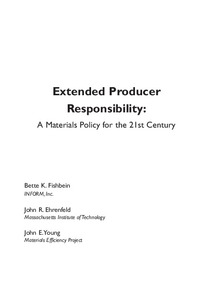Extended producer responsibility: a materials policy for the 21st Century
"The twentieth century began with a world population of 1.5 billion; the twentyfirst begins with 6 billion and is headed to nearly 10 billion by mid-century. These large increases in population, along with rising standards of living and consumption, are increasing the pressures on the earth as...
| Main Authors: | , , |
|---|---|
| Institution: | ETUI-European Trade Union Institute |
| Format: | TEXT |
| Language: | English |
| Published: |
Brooklyn
2000
INFORM |
| Subjects: | |
| Online Access: | https://www.labourline.org/KENTIKA-19122961124919401439-extended-producer-responsibili.htm |
| _version_ | 1771659896466440194 |
|---|---|
| author | Fishbein, Bette K. Ehrenfeld, John R. Young, John E. |
| author_facet | Fishbein, Bette K. Ehrenfeld, John R. Young, John E. |
| collection | Library items |
| description | "The twentieth century began with a world population of 1.5 billion; the twentyfirst begins with 6 billion and is headed to nearly 10 billion by mid-century. These large increases in population, along with rising standards of living and consumption, are increasing the pressures on the earth as both a source of our resources and a sink for our wastes. As the new century dawns, it is essential that we take stock of the state of the environment. There are many dimensions to the environmental challenges of the twenty-first century, including the levels of energy and materials use that can lead to depletion and to air, land, and water pollution that exceeds the capacity of the earth to absorb it. The issue of waste cuts across all these problems. In the traditional linear pattern of materials use, materials are extracted from the earth, processed, made into products, and ultimately discarded as waste. It is well understood that waste disposal in incinerators and landfills contributes to pollution. What is not well understood is that waste has upstream environmental impacts as well, and that these dwarf the impacts of pollution resulting from waste disposal. Waste represents a squandering of resources. By reducing waste, closing material loops, and making products that can be reused, remanufactured, and recycled, the huge impacts of materials extraction and processing can be substantially reduced." |
| format | TEXT |
| geographic | USA |
| id | 19122961124919401439_bd7ec4acf32c413fb9a6314630005847 |
| institution | ETUI-European Trade Union Institute |
| is_hierarchy_id | 19122961124919401439_bd7ec4acf32c413fb9a6314630005847 |
| is_hierarchy_title | Extended producer responsibility: a materials policy for the 21st Century |
| language | English |
| physical | 296 p. Digital |
| publishDate | 2000 |
| publisher | Brooklyn INFORM |
| spellingShingle | Fishbein, Bette K. Ehrenfeld, John R. Young, John E. corporate social responsibility economic growth environmental impact assessment recycling of materials sustainable development waste Extended producer responsibility: a materials policy for the 21st Century |
| thumbnail | https://www.labourline.org/Image_prev.jpg?Archive=109706892798 |
| title | Extended producer responsibility: a materials policy for the 21st Century |
| topic | corporate social responsibility economic growth environmental impact assessment recycling of materials sustainable development waste |
| url | https://www.labourline.org/KENTIKA-19122961124919401439-extended-producer-responsibili.htm |

